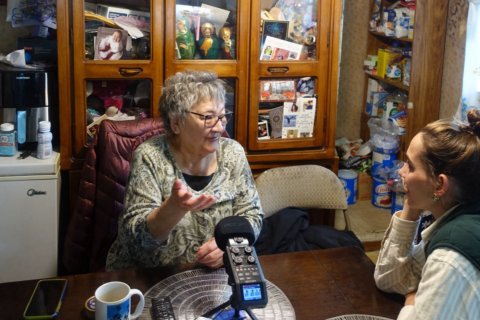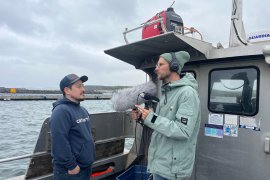New 'Tipping the Iceberg' podcast: an Indigenous small island community talks about food and the future

New podcast Tipping the Iceberg explores the legacy, stories, and living memories of the Unangax̂, an isolated Indigenous Arctic community fighting to ensure food security while preserving its unique way of life. Utrecht University PhD researcher Silja Zimmermann created the mini-series with scientists, community members, tribal representatives, subsistence providers, elders, and local youth.
Arctic Indigenous communities are being hit particularly hard by the multiple crises of the 21st century. Overfishing, centuries of colonization, and the climate crisis threaten communities across the North. Key food sources are dwindling, traditional knowledge is lost, and more and more people are moving to cities. There are many reasons to feel paralyzed. But what if there is hope after all? We often only see the tip of the iceberg. To truly understand and find solutions we need to delve deeper.
Together, we explore the question: How can food security be ensured in the face of multiple crises in the future? And how do we get there?
The Tipping the Iceberg podcast immerses us in the world of the Unangax̂ (Aleut) community on St. Paul Island, Alaska. Across four episodes, transdisciplinary PhD researcher Silja Zimmermann interviews scientists, community members, tribal representatives, subsistence providers, elders, and local youth. “Together, we explore the question: How can food security be ensured in the face of multiple crises in the future? And how do we get there?”
Aired on local radio
The 'Tipping the Iceberg' podcast has been aired on KUHB, St. Paul Island's local radio station. With radio an essential source of information for the island's residents, its broadcast ensures that the podcast is able to reach a significant portion of the community.
The partnership between Zimmermann and Wiebe de Jong from VU Amsterdam and the invaluable contributions from the St. Paul Island community have led to a rich, multi-dimensional exploration of local issues and solutions, seamlessly blending academic insight with local wisdom. “The journey from concept to reality has been deeply collaborative and enlightening,” says Zimmermann.
The Tipping the Iceberg podcast is part of a larger-scale research project focusing on how participatory processes and knowledge co-creation can achieve sustainable transitions in food systems for and with Arctic Indigenous communities. The podcast's development was generously supported by Public Engagement at Utrecht University. You can listen to the podcast below or through Spotify.
Idea and realization: Silja Zimmermann
Edit and production: Wiebe de Jong
Artwork: Lydia Dirks
Trailer: 'Tipping the Iceberg'
Indigenous food security is a lifeline. It’s more than just calories or nutrients. It’s a connection between the past and today’s self. In a community that is deeply connected to its surrounding environment, food security reflects the health of an entire Arctic ecosystem. Thus, high levels of food insecurity show there must be something seriously wrong.
Join host Silja Zimmermann on a journey to explore the food system of the Unangax̂ (Aleut) community of St. Paul Island, Alaska. Learn about the challenges imposed on the 'People of the Seal', and, more importantly, learn about potential solutions. Is a brighter future possible?
Episode 1: 'In Need of Transformation'
Climate change, wildlife decline, environmental degradation. The world is in constant emergency, and current efforts are failing to solve these interconnected challenges. What we need is transformative change. Globally and locally. For the small community on St. Paul Island, their whole livelihood is at stake. Populations of important subsistence species are declining, the local crab fishing economy has crashed, food prices are high, and people are leaving the island. How can we not lose hope?
In the first episode, host Silja Zimmermann meets scientists who explain what the Tipping the Iceberg project and Indigenous food security are and why transformative change is so important for St. Paul.
Episode 2: 'If the Seals are Gone, we are Gone'
As “Slaves of the Harvest”, the Pribilof Aleuts were forced into the commercial fur seal industry by first Russians and later by US colonizers. The history of the St. Paul Island is an eventful one. The tides of history still echo in St. Paul, but the small island community stands resilient.
In the second episode of Tipping the Iceberg, St. Paul Island cultural leader Aquilina Lestenkof takes us through the eras that shaped the 'People of the Seal'. Listen in as elders lend their voices and wisdom to reveal the struggles and triumphs of the Aleut community, and join us to discover the legacy, stories, and living memories of a community fighting to preserve its unique way of life.
Episode 3: 'Tides of Change'
After the US Government phased out of its operations and the commercial fur seal harvest ended, the community needed to develop an alternative economy. Crab fishing brought a new source of income to St. Paul Island. The community became prosperous during a time when no one expected the industry to collapse. Today, St. Paul is again facing an uncertain future with a struggling industry weakened by overfishing through the global pollock industry and crashing crab populations triggered by the climate crisis. What does this mean for the community?
Tides of Change tells stories about contemporary life on St. Paul Island. A life between traditional subsistence activities and a modern economy. Often, it is a life full of joy despite all adversity, thanks to community cohesion.
Episode 4: 'Planting Seeds of Hope'
A small community garden, a local reindeer meat processing facility, and a local research center in the middle of the Bering Sea - numerous plans and initiatives can make a lasting change to life on St. Paul Island.
In this episode, host Silja Zimmermann takes us on a journey to explore how small positive initiatives, the 'seeds', can grow into a bright future for the St. Paul Island community. Tune in to meet scientists and community members who offer a hopeful glimpse into the island’s future. This episode is a must-listen for anyone interested in community-led initiatives and the vibrant future of St. Paul Island.




